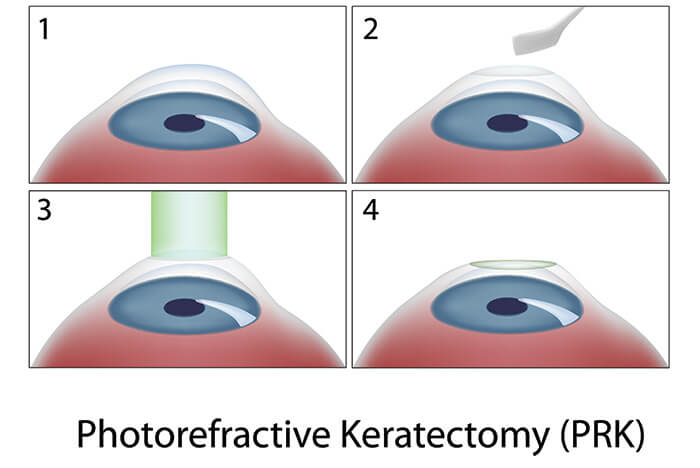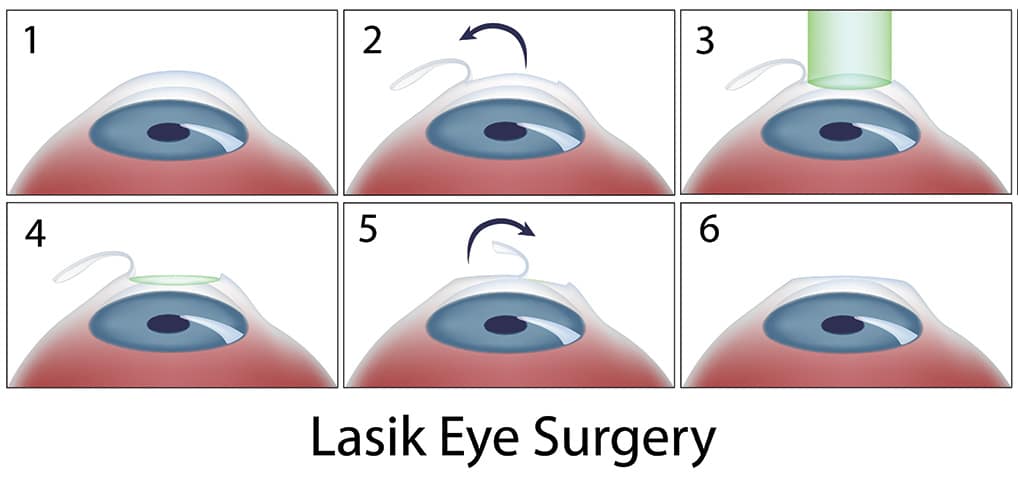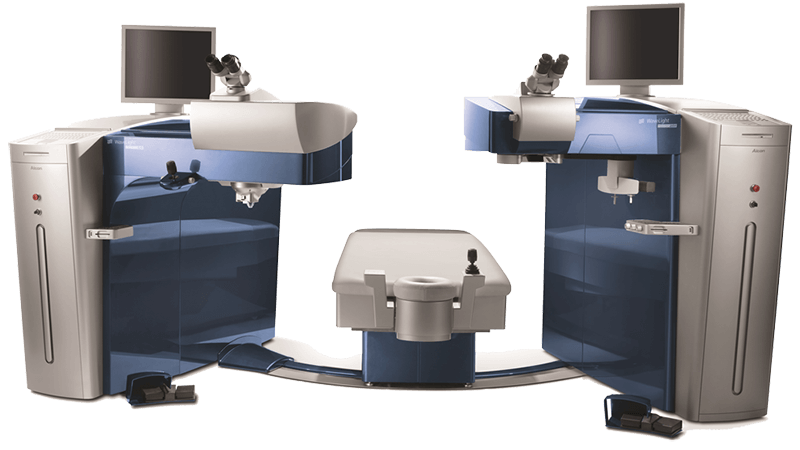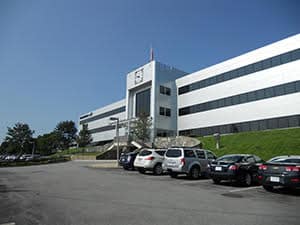
First, you will have a complete eye exam. Then, a Laser Vision Correction Consultation will be scheduled which includes additional tests. These are simple and painless. Dr. Dwayne Baharozian will discuss and recommend the best type of refractive surgery for you. You may print the lifestyle questionnaire below and bring it with you to the office. Your answers will help us assist you in determining the best possible options regarding your eye health.
Your ocular health is our bottom line. This is why we invest in state-of-the-art equipment and laser technology. Westford laser vision correction specialist, Dr. Baharozian uses the most technologically advanced laser in the world today.
Laser Vision Correction has been performed for over 25 years and, in that time, has received extensive media coverage and advertising. The purpose of this document is to educate you with straightforward facts regarding Laser Vision Correction and the different options that exist. Please read this material carefully and discuss any questions you may have with Dr. Baharozian or his knowledgeable ophthalmic technicians.
Using one of two procedures, Laser Vision Correction uses a computerized laser to correct a person’s refractive error. This refractive error may consist of nearsightedness (myopia), and/or astigmatism. Farsightedness (hyperopia) is no longer treated with LVC. The procedures that are available to be performed are PhotoRefractive Keratectomy (PRK) and Laser Assisted In Situ Keratomileusis (LASIK).
Both procedures are performed on a person’s cornea using the same excimer laser. The cornea is the clear tissue in the front of a person’s eye and is responsible for two thirds of the focusing process performed by the human eye.
The manner in which the cornea is reshaped is slightly different with each technique. A general overview including advantages and disadvantages of each procedure are described below.
PRK is the original procedure performed using the excimer laser in order to achieve Laser Vision Correction. PRK corrects a person’s vision by reshaping the surface of the cornea. When performing PRK, a speculum is used to hold open a person’s eyelids. The surface layer of the cornea (the epithelium) is removed with a rotating brush or with a dilute solution of alcohol. The surface layer immediately below the epithelium is then reshaped using the computerized excimer laser. Mitomycin C, an anti-metabolite medication, may be applied to the corneal surface immediately following the actual laser treatment. This medicine greatly reduces the chance of developing post-operative stromal haze in patients who have higher levels of nearsightedness.
Acting as a bandage, a specialized clear contact lens is placed over the reshaped cornea for comfort and protection. The entire procedure is done under mild oral sedation with topical anesthesia (numbing eye drops) and is painless. PRK takes roughly 10 minutes to perform on each eye.
PRK is an outstanding procedure for those patients who qualify. When compared to LASIK, PRK has both advantages and disadvantages. For instance, PRK is less invasive than LASIK because the procedure is performed on the surface layers of the cornea. It is not necessary to create a corneal flap thus eliminating all potential flap complications associated with LASIK.

On the other hand, the immediate post-operative recovery period can be fairly uncomfortable for some PRK patients. Healing of the top layer of cells (the epithelium) usually takes 3 to 5 days. During the recovery period, a bandage contact lens is used, and topical drops and oral pain medication may be needed to reduce whatever pain or discomfort a patient may experience. The vision in a PRK patient is hazy for anywhere between 3 to 7 days after which it steadily clears. After roughly 10 days, the vision should be quite clear.
LASIK is a procedure that combines the previously developed technique of lamellar refractive surgery with excimer laser technology. LASIK utilizes the same computerized excimer laser as PRK but treats a slightly deeper layer of the cornea known as the stroma. First, a suction ring is applied to the eye in order to elevate the internal pressure of the eye as well as to immobilize the eye. Next, an ultra-short pulsed laser known as VisuMax® is used to create a thin corneal flap. This technique of making the corneal flap is known as “bladeless“. Simply put, utilizing the VisuMax® bladeless technique is the safest and most accurate way of creating a corneal flap. The suction ring is then removed and a speculum is inserted to hold open a person’s eyelids. The hinged flap is now lifted and folded back superiorly. Laser Vision Correction is then performed on the underlying corneal bed. After this tissue is reshaped, the corneal flap is placed back down over the treated area in its proper, original position.

The corneal flap seals itself quickly to the underlying corneal bed. The entire procedure is performed under topical anesthesia (numbing eye drops) and is painless. LASIK takes roughly 20 minutes to perform on each eye.
When compared to PRK, LASIK has both advantages and disadvantages. For instance, a patient who undergoes LASIK usually experiences rapid improvement in his or her vision (i.e. the next day). Also, a LASIK patient experiences minimal discomfort if any during the healing process. On the other hand, the risks of LASIK are higher than those of PRK. Although meticulous attention is paid to surgical techniques, complications may occur during the creation of the flap or during the healing phase.
It is very important that all LASIK patients be very careful not to accidentally dislodge the flap especially during the first two weeks of the healing process. This includes eliminating some physical activities (i.e. all contact and ball sports, swimming, horseplay, etc.). In addition, protective clear plastic shields must be taped over the eyes when sleeping for at least one week.
Dwayne B. Baharozian, MD has performed over 1500 Laser Vision Correction procedures using the most innovative technology available to him. He operates in Andover at Boston Vision using the Alcon WaveLight® FS200 Femtosecond Laser and the Allegretto WaveLight® EX500 Excimer Laser. These are the most technologically advanced lasers in the world today used for Laser Vision Correction.

When performing LASIK or PRK, Dr. Baharozian utilizes Contoura® Vision Topography-Guided Ablation (optimized wavefront ablation), an advanced Laser Vision Correction procedure that actually adapts to the unique curvature of the human eye. Unlike earlier LASIK procedures that reshaped the human cornea without taking into consideration the natural curvature, Contoura® Vision Topography-Guided Ablation reshapes the cornea more closely to an ideal, natural shape. As a result, Contoura® Vision Topography-Guided Ablation can help preserve or improve the quality of one’s vision. Contoura® Vision Topography-Guided Ablation is performed using Wavelight® Topolyzer® Vario and the technologically advanced Allegretto WaveLight® EX500 Excimer Laser which combines speed, precision and simplicity to achieve outstanding results.
The facts about Contoura® Laser Vision Correction with WaveLight® technology:
To have more of your questions answered and to determine if you would benefit from Laser Vision Correction, an appointment for a complete eye exam will be scheduled with one of our optometrists. If you are not a current patient of The Family Eye Care Center please provide us with medical records regarding your most recent eye exam, refractive error (eyeglass prescription) and a current pair of glasses or an unopened pair of contact lenses.
If at this visit you are deemed by the doctor to be a “potential” candidate for LVC surgery and you would like to move forward in the process, please call our office. Our receptionist will take your contact information and the Laser Vision Correction Coordinator will return your call as soon as possible. You will then be scheduled for an LVC consult with Dr. Baharozian to further assess your candidacy for the procedure.
During your consultation, a review of your refractive error and lifestyle is done to determine the best visual outcome for your individual situation. This one-on-one question and answer period (which includes a short educational video) can help you make the decision if Laser Vision Correction is right for you.
The decision to have Laser Vision Correction is an important one that ultimately only you can make. It is important that you have realistic expectations. Your decision needs to be based on facts not hope, hype or misconceptions. Also, it is important to understand that all surgeries come with some risk. The goal of any refractive surgical procedure is to reduce your dependence on corrective lenses. Laser Vision Correction does not always result in 20/20 vision. Carefully consider the pros and cons of each form of Laser Vision Correction. Do not feel pressured by anyone to make a decision about having surgery. In the end, only you can decide if Laser Vision Correction is right for you.
Once you have decided to proceed, please call our office to speak with a Laser Vision Correction Coordinator. She will guide you through the scheduling and pre-testing process. As previously discussed, there are several pre-operative testing visits needed. During these visits, a thorough evaluation of your eyes is done including a refraction, pachymetry and corneal topography. (Unfortunately, in some instances, we may discover an underlying condition that limits your Laser Vision Correction choice or may even eliminate you as a Laser Vision Correction candidate altogether). There is a $100.00 non-refundable fee which will be collected on the day of the LVC Consult with Dr. Baharozian.
We will review each detail of the Laser Vision Correction procedure, including its risks, benefits and alternatives. You will have a firm understanding of the entire process prior to having your surgery.
The preoperative appointment schedule will be:
It is imperative that all contact lens* wear be stopped prior to the following appointments:
*Specifically: soft contact lenses need to be discontinued 2 weeks prior and rigid gas permeable lenses 4 weeks prior.
During the LVC pre-operative visit (the visit after your LVC Consult), punctal plugs** are inserted in the lower tear duct drainage openings of each patient regardless of the Laser Vision Correction procedure to be performed. Punctal plug insertion is an office procedure that is safe, quick, painless and totally reversible. Once inserted, a person should not feel their presence and they do not require any special care. These tiny devices, made of flexible silicone, act much like a cork, occluding (blocking) the drainage duct that carries tears away from the eye’s surface. Often used to treat dry eye syndrome, punctal plugs will allow for better healing during the Laser Vision Correction post-operative period.
**Punctal plugs insertion are billed to your medical insurance company and are subject to copayments and deductibles/coinsurance.
In conclusion, Laser Vision Correction is a commonly performed procedure that corrects a person’s refractive error. The high rate of patient satisfaction is the reason for its popularity. Dr. Baharozian has over 15 years experience performing Laser Vision Correction procedures and will personally handle your care from start to finish. He has a full service medical practice that will care about you and your vision for a lifetime. Some Laser Vision Correction Centers are financially driven to “sell” you on Laser Vision Correction. As health care professionals, we are motivated to provide you with superior medical care using state-of-the-art equipment. Your ocular health is our bottom line. To see if we can help you achieve a life less dependent on glasses or contact lenses with Laser Vision Correction, please call the office and schedule an appointment.
Factors such as your age, your health, your lifestyle and the anatomy of your eye(s) will determine whether refractive surgery is right for you. 94% of people wearing corrective lenses are candidates.
Request an AppointmentFINAL THOUGHTS
In conclusion, Laser Vision Correction is a commonly performed procedure that corrects a person’s refractive error. The high rate of patient satisfaction is the reason for its popularity. Dr. Baharozian has over 20 years of experience performing Laser Vision Correction procedures and will personally handle your care from start to finish. He has a full service medical practice that will care about you and your vision for a lifetime. Some Laser Vision Correction Centers are financially driven to “sell” you on Laser Vision Correction. As health care professionals, we are motivated to provide you with superior medical care using state-of-the-art equipment. Your ocular health is our bottom line. To see if we can help you achieve a life less dependent on glasses or contact lenses with Laser Vision Correction, please call us.
Dr. Baharozian operates at Mass. Eye and Ear, Waltham approximately 25 minutes from the Family Eye Care Center & Optical Gallery. This facility offers the most advanced Laser Vision Correction technology and an experienced, stable team of talented Laser Technicians.

Mass Eye and Ear, Waltham
1601 Trapelo Road
Reservoir Place, Ste. 184
Waltham, MA 02451